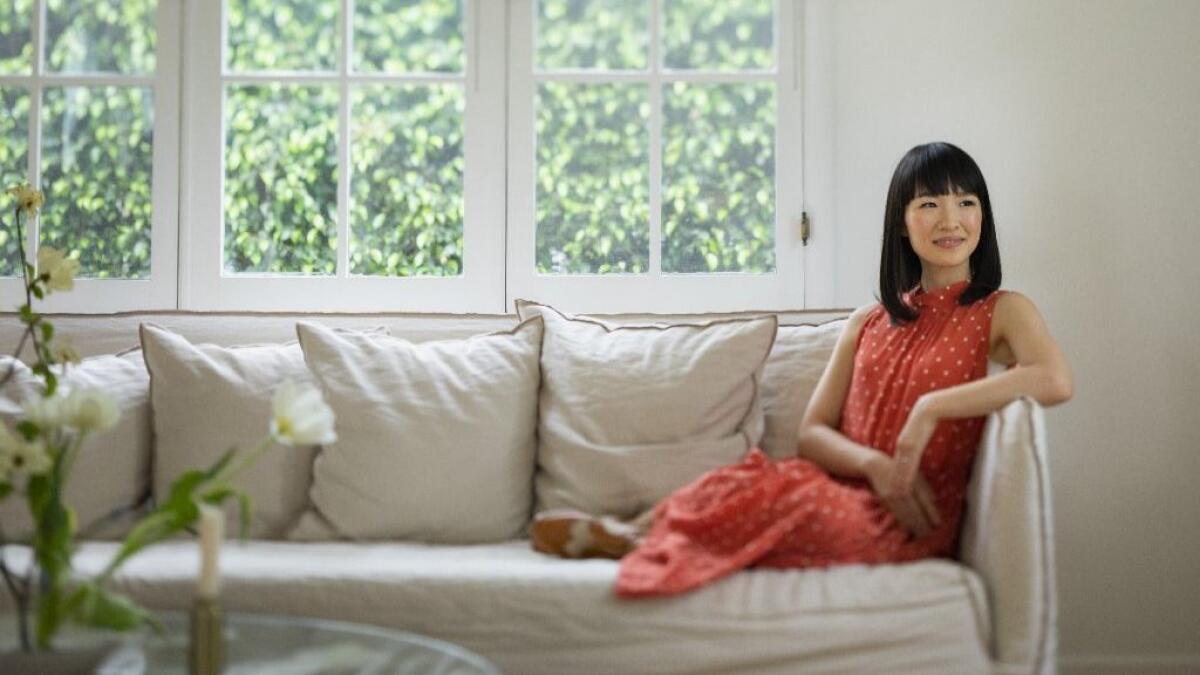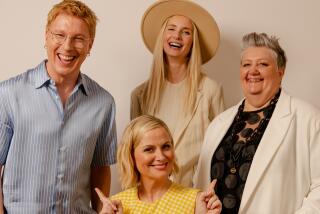Q&A: In ‘Tidying Up,’ Marie Kondo finds joy of her own in helping others

- Share via
First, Marie Kondo conquered the bestseller lists. In 2014, “The Life-Changing Magic of Tidying Up” introduced the world to the Japanese organizer’s philosophy about tidying. In short: Keep what sparks joy, and release, with gratitude, what doesn’t.
Next, she conquered America, or at least Hollywood, with her Netflix series “Tidying Up With Marie Kondo.” Kondo was suddenly the talk of the town, even turning up at the Oscars. Each episode finds Kondo and her interpreter, Marie Iida (who goes by Iida on the series to reduce confusion), visiting an Angeleno family in disarray. With infinite patience and her trademarked KonMari Method, she helps them bring balance to their homes and their lives.
Kondo and her family presently reside in Los Angeles as she considers the next move in her mission to add joy and relieve stress in the world. (A children’s book is due out in November.)
At precisely the prearranged time, naturally, she arrives in the residential office of KonMari’s marketing company. Kondo is 4-foot-7, impeccably turned out in an orange dress with white polka dots, a cream sweater over her shoulders, and two-toned saddle shoes. She sits on a couch with perfect posture, her hands resting quietly in her lap until she speaks, at which point they paint pictures in the air. She understands questions in English, but answers in Japanese, after which Iida, sitting next to her, quickly translates — until it comes time for Kondo to talk about her translator. “She’s amazing!” Kondo exclaims in English, as Iida blushes.
The book was already a bestseller years ago, but this show takes KonMari to a whole new level. Did you have any qualms about opening yourself up to such exposure?
I was a little worried at first. Ever since I was a little girl I devoted myself to tidying, so personality-wise I’ve always liked to be at home alone, and even when I gave my lessons with clients, it was usually one-on-one, quietly confronting their things. So I was a little taken aback and surprised by not only the show but what it garnered. But I’ve always been very passionate about spreading the message of tidying, so in that regard I’m so honored and happy to see everybody’s reaction to that.
Could you explain that message? It goes much deeper than just decluttering.
It’s for as many people as possible to discover their sense of value, and what they want to cherish in their lives, through tidying. These may seem like small changes in individual people’s lives, but I think it can accumulate into a big overall change in the world.
You have a spiritual approach to people’s homes and possessions — how did that emerge in your practice?
I’ve seen time and again, in person while I was conducting these lessons, each item having a special feeling or emotion imbued within them. Some items may seem a little lonely, while others may seem much livelier. I felt even an inanimate object was imbued with a certain energy, and reacted to how it is being used by the owner.
What has been the most surprising aspect of the show for you?
American houses are so spacious! I’ve been tidying in Japan for so long, so I thought I’d be able to tackle any kind of house, but it was a completely different level in America.
Why do you think the show has become such a part of the zeitgeist here?
We live in an age where there’s a plethora of both information and material things, and it definitely contributes to our stress, but for the longest time, we were not sure what to do about it. I think where my method is very useful is because it tells you what to do in very clear and actionable steps. Not only that, but my method treats tidying not just in physical terms, but it’s a very introspective process that allows you to reflect on yourself and how you want to live your life.
With fame comes backlash. Your method has been criticized for being ruthless. How do you respond to that?
There was some information — like you should limit yourself to 30 books — that was completely misconstrued, and was spread around as if it was part of my message. I know within myself that it’s impossible for what I’m thinking and my message to be clearly understood by everyone. But I do feel that it’s a good thing for my method to be turned into a discussion. As long as it becomes an opportunity for everyone to start thinking about tidying and their way of life, I think that’s a positive.
More to Read
From the Oscars to the Emmys.
Get the Envelope newsletter for exclusive awards season coverage, behind-the-scenes stories from the Envelope podcast and columnist Glenn Whipp’s must-read analysis.
You may occasionally receive promotional content from the Los Angeles Times.









